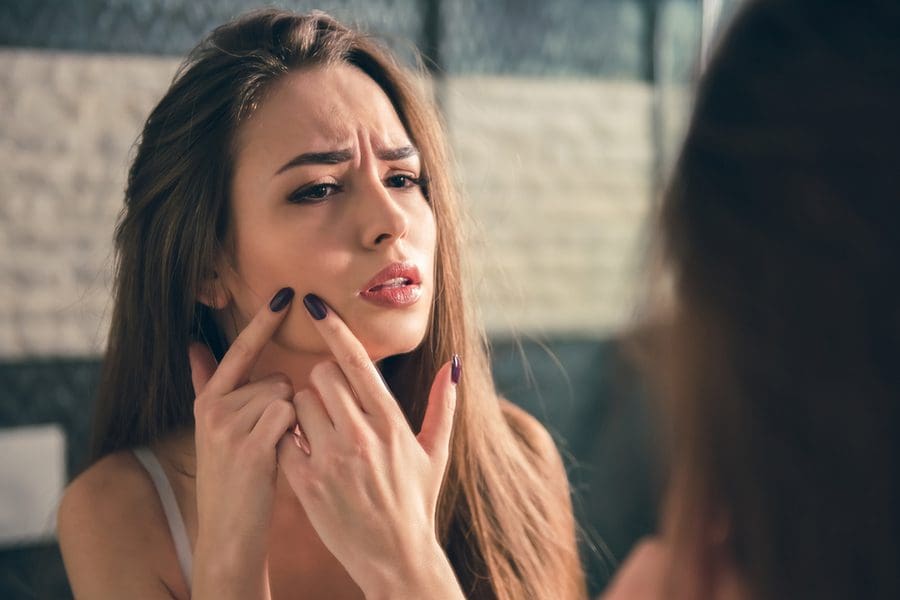There is so much information out there on acne: what causes it, how to get rid of it, the best skincare products for it, the list goes on. You can buy books about changing your diet. You can spend hundreds or thousands on an array of products and try bizarre home remedies.
A lot of what we think we know about acne is advice being passed on and re-told so often that it becomes oversimplified and misinterpreted. Not all acne should be treated the same, so let’s clear up some urban legends that may be more likely do harm your skin than heal it.
Half-Truth: Makeup causes acne.
Fact: Some heavy cosmetics can clog pores and cause acne. This is called acne cosmetica. Some women that might not otherwise have acne can develop acne cosmetica from wearing pore-clogging makeup.
If you think heavy makeup may be contributing to your acne, don’t worry, you don’t have to swear off makeup entirely. Instead, look for lighter complexion products that are labeled non-comedogenic, which means they won’t clog pores. Make sure you are removing your makeup properly before bed, and look for skincare products that are also non-comedogenic. You can have a reaction to anything you use on your skin, but if you watch out for ingredients that don’t agree with you, your skin will be much calmer and happier. It comes down to finding the right foundation with skin-loving ingredients.
Half-Truth: The sun will dry out your acne.
Fact: The sun will dry out your skin, and vitamin D reduces inflammation, which can help the appearance of acne. Sunlight as an acne treatment is a delicate proposal that can quickly become more harmful than beneficial. First of all, not all acne is caused by excess oil. You can have dry or dehydrated acne-prone skin, which the sun would only exacerbate. On top of that, prolonged sun exposure can cause much more serious and permanent damage to your skin.
A little sunshine is good for your skin, but please (!) protect your pretty face with SPF, even on days when you’re not spending prolonged time outside. Sun damage can cause sunspots, scarring, and even skin cancer. Also, be aware that some of the most effective acne treatments make your skin more susceptible to sunburn. Try a mineral sunscreen with actives like titanium dioxide or zinc oxide, as these formulas are gentler on the skin and less likely to clog pores. Plus, those minerals are often used in acne treatments.
Half-Truth: A poor diet leads to acne.
Fact: Sugar and salt can stress out your skin and cause oil production and inflammation. That doesn’t mean that that is what is causing everyone’s acne, though. You can have perfectly balanced diet and still have acne. Some people can eat greasy and sugary foods daily and have perfectly clear skin. This is where things differ for everyone.
Your body’s reaction to certain triggers can lead to inflammation. If you suffer from acne, try limiting your intake of processed sugars and dairy for a few weeks to see if there’s a noticeable change in your skin. It is worth a try, but it may not be what your issue is.
Half-Truth: If you have acne you’re dirty.
Fact: Dirt, dead skin, and excess oil can clog pores, but that doesn’t mean that anyone who has acne is simply not washing their face enough. In fact, acne is very rarely caused by dirt.
Having acne doesn’t mean you have poor hygiene or need to wash your face more. In fact, acne can be aggravated by too much cleansing. Contrary to teen skincare beliefs, stripping your skin of all its natural oils simply signals your skin to overproduce oil, creating a vicious cycle of imbalanced skin. You can have a perfect skincare routine and still have acne. Acne is regularly caused by internal issues with your gut, kidneys, and hormones. Surface factors can play a part, but having acne does not mean your skin is dirty.
Half-Truth: Acne is caused by hormones.
Fact: Hormonal imbalances are a common cause of acne. Hormones are the main trigger for teenage acne, and often cause flare-ups for women before their time of the month. However, acne is not just a hormone issue. Acne can be fungal, bacterial, hormonal, or a mix of all three.
A dermatologist can help determine the right routine and methods for you, but finding the answer will require patience. Take care of your skin along the way.







